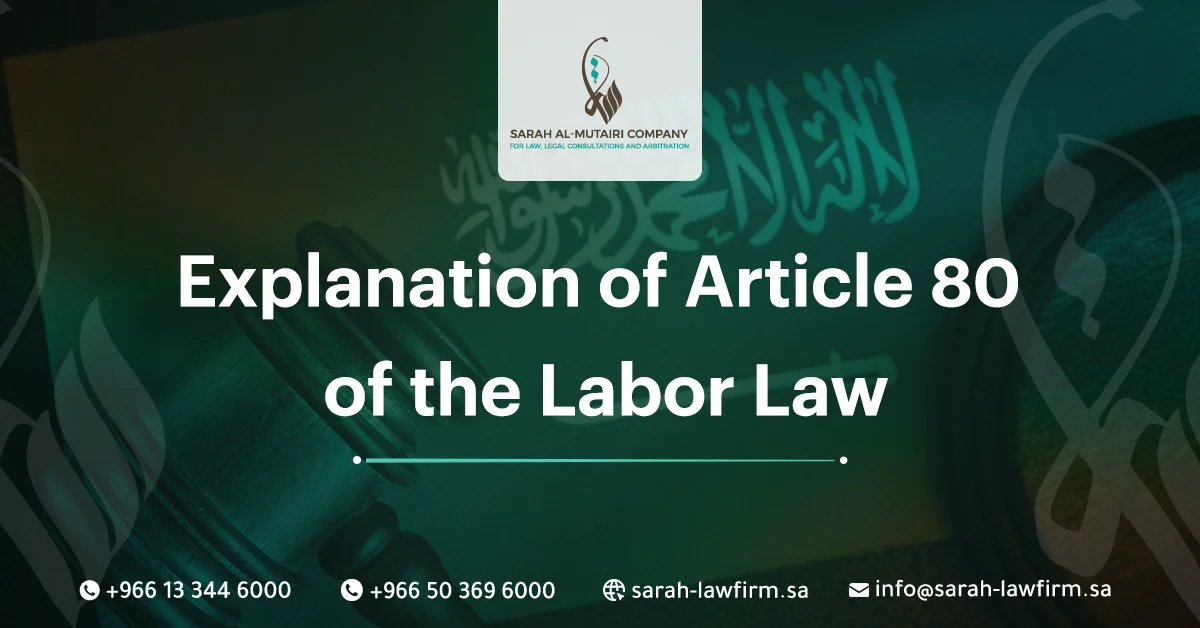In Saudi Arabia’s work environment, both employers and employees need to understand their rights and obligations under the Saudi Labor Law. One of the most frequently discussed and questioned provisions is Article 80 of the Saudi Labor Law, which addresses cases in which an employer may terminate an employment contract without end-of-service benefits or prior notice.
Understanding Article 80 of the Saudi Labor Law helps you determine when termination is lawful and when it is arbitrary, allowing you to protect your rights and take appropriate legal action at the right time.
In this regard, Sara Al-Mutairi Law Firm for Legal Consultations and Arbitration clarifies that adhering to the text of Article 80 ensures a balanced relationship between employer and employee, and reduces disputes that may arise from unlawful terminations.
In the following sections, we will explain the details of Article 80 of the Saudi Labor Law, its latest amendments, and a breakdown of its main provisions.
Amendments to Article 80 of the Saudi Labor Law
Article 80 of the Saudi Labor Law was amended by Royal Decree No. (M/46) dated 5/6/1436 AH. The amendment focused on expanding the legitimate cases for termination and clarifying the procedures that employers must follow before ending a contract.
One of the key changes was the addition of an explicit condition requiring the employer to give the employee an opportunity to present reasons for opposing the termination before the decision is finalized.
This amendment reinforces the principle of procedural fairness and grants the employee the right to defend themselves before the employment relationship is terminated.
The revision also rephrased several clauses for greater precision and clarity, especially in defining the violations that justify termination without compensation or notice.
Furthermore, the amendment extended the permissible absence period that may lead to termination from 20 days per year to 30 days, and from 10 consecutive days to 15 days, while maintaining the requirement of a prior written warning.
These amendments aim to create a fairer balance between employee rights and employer authority, ensuring that termination occurs only in serious cases and in accordance with legal procedures.

Text of Article 80 of the Saudi Labor Law
Below is the official text of Article 80 of the Saudi Labor Law as amended by the Royal Decree:
“An employer may not terminate the contract without end-of-service benefits, notice, or compensation except in the following cases, provided that the employee is given an opportunity to present reasons for opposing the termination:
- If the employee assaults the employer, the manager, any supervisor, or subordinate during or because of work.
- If the employee fails to fulfill essential contractual obligations, disobeys lawful orders, or deliberately violates safety instructions publicly displayed by the employer, despite receiving a written warning.
- If the employee is proven to have engaged in misconduct or committed an act violating honor or integrity.
- If the employee intentionally causes material damage to the employer, provided that the employer must report the incident to the authorities within twenty-four hours of knowledge.
- If the employee obtained employment through fraud or forgery.
- If the employee is still under probation.
- If the employee is absent without a valid reason for more than thirty days in a contractual year, or for more than fifteen consecutive days, provided that the employer issues a written warning after twenty days of absence in the first case and ten days in the second.
- If the employee improperly exploits their position for personal gain.
- If the employee discloses industrial or commercial secrets of the business.”
Provisions of Article 80 of the Saudi Labor Law
The provisions of Article 80 of the Saudi Labor Law outline the situations in which an employer may legally terminate an employee without notice or compensation, provided there is clear evidence of misconduct.
The Ministry of Human Resources and Social Development has emphasized that the employer must document the reasons for termination and formally notify the employee, ensuring that termination is carried out through lawful and written procedures—not based on personal or verbal decisions.
If none of the listed cases apply, the termination is considered unlawful (arbitrary dismissal), and the employee has the right to claim compensation under Article 77 of the same law.
Explanation of Article 80 of the Saudi Labor Law
When explaining Article 80 of the Saudi Labor Law, it becomes clear that the article aims to protect the interests of both parties. It grants the employer the right to terminate in specific, serious cases that may harm the establishment, but it also safeguards employees from being dismissed without a legitimate cause.
An employer cannot rely on Article 80 as a pretext for termination unless there is a valid and documented legal reason.
Cases of Employee Termination Under Article 80
The cases in which an employer may terminate an employee under Article 80 of the Saudi Labor Law include:
- Proven fraud or forgery in employment documents.
- Intentional damage to company property.
- Physical or verbal assault in the workplace.
- Repeated absenteeism without a valid excuse.
- Violations of occupational safety instructions.
In all such cases, the employer may terminate the contract without prior notice or end-of-service compensation.

Conditions for Termination Without Notice
For termination without notice to be lawful and not arbitrary, the following conditions must be met:
- The reason must be legitimate and supported by evidence.
- The employee must be formally notified of the reason for termination.
- The cause should not stem from the employer’s own fault.
- The employer must follow proper legal procedures.
If an employee is terminated without a valid reason falling under Article 80 of the Saudi Labor Law, they may file a complaint with the Labor Office to review the case and determine appropriate compensation.
Relationship Between Article 80 and Article 77 of the Saudi Labor Law
When discussing Article 77 of the Saudi Labor Law it defines the right to compensation when a contract is terminated without a valid reason.
In other words, if none of the provisions of Article 80 apply, the termination is considered arbitrary, and the employee is entitled to compensation under Article 77, which grants 15 days’ wages for each year of service in indefinite contracts or the remaining duration’s salary in fixed-term contracts.
Conclusion
Understanding Article 80 of the Saudi Labor Law helps you avoid legal pitfalls, whether you are an employer or an employee.
If you are facing termination or wish to verify the legality of your case, contact Sara Al-Mutairi Law Firm for Legal Consultations and Arbitration to receive professional legal advice on the Saudi Labor Law, protecting your rights and helping you make informed decisions.
Book your legal consultation now and know your rights before taking any step.
FAQ
When can an employer terminate an employee without compensation or notice?
Only in the cases listed in Article 80 of the Saudi Labor Law, such as long-term absenteeism, fraud, deliberate damage, or workplace assault.
2. What is the difference between Article 77 and Article 80 of the Saudi Labor Law?
Article 80 outlines cases allowing termination without compensation, while Article 77 determines compensation for unlawful termination.
3. Can an employee contest termination under Article 80?
Yes, the employee has the right to file a complaint with the Labor Office to prove that the termination was unlawful and claim compensation.




لا تعليق